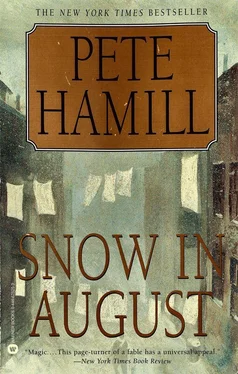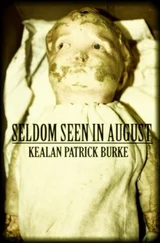“I wish he’d fall down the crack of his ass,” Sonny said, and they all laughed.
Then one rain-drowned evening when his mother wasn’t working at the movie house, Michael came upstairs and into the kitchen and saw a large cardboard box off to the side and his mother beaming. The room was loud with Al Jolson singing “April Showers,” and though it wasn’t yet April there had been a lot of showers, and Jolson made their annual arrival sound like an occasion of joy. While Jolson promised that the showers of April would bring the flowers of May, Kate Devlin pointed in the direction of the voice, and on a shelf between the kitchen and the first bedroom, shaped like a small cathedral, was a new Philco radio.
So keep on lookin’ for the bluebird , Jolson was singing, An’ listenin’ to his song , as Michael’s mother joined for the last triumphant line, Whenever April showers come along ….
“Up the Republic!” she shouted, as she always did when she was delighted. She had saved and saved and here it was: a new radio, and a Philco at that. An aerial emerged from the back of the radio and snaked around the wall molding to dangle out a window into the yards. No static distorted the voices; the sounds of human beings were as clear as water. The radio also had shortwave, and the names of distant places were printed in tiny letters on the glowing dark yellow dial. Copenhagen. London. Dublin. Paris. Moscow. And there, yeah, would you look at that? Prague!
“It’s beautiful, Mom,” he said. “I can’t believe it.”
“Neither can I,” she said. “It was a real bargain down at Ginsberg’s.”
He didn’t ask how much she had paid; he knew better than to try to get her to talk about money. Instead, he turned away from the new radio, listening now to Les Brown and His Band of Renown, and saw the peeling face of the leatherette Admiral, lying on its side on a chair beside the gas stove. The cord and plug dangled uselessly a few inches off the linoleum floor. The old radio looked as sad as a man without a job.
“What are you going to do with the old one, Mom?” he asked.
“God, who knows? Give it to the St. Vincent DePaul Society, maybe. Maybe some poor soul will find it there.”
A pause.
“Can I give it to Rabbi Hirsch?”
“Och, Michael, it’s a terrible oul’ heap of junk. The rabbi might be insulted.”
“No, no. He’d be — Mom, he’s poor . He has almost no money. I know he wants to hear music. So…”
She smiled. “Do what you like,” she said, and moved the dial in search of the Lux Radio Theater .
The next day, there was no rain. Michael rushed home after school, dropped off his books, picked up the old leatherette Admiral and went back up the hill to the synagogue. When Rabbi Hirsch answered the door, the boy handed him the radio.
“What’s this?”
“It’s for you,” Michael said. “It’s not the greatest, but it works.”
The rabbi held the radio in both hands and for a moment didn’t move. It was as if he were receiving something holy. Michael imagined him in the café in Prague when he was young, listening with his friends to the many languages of Europe.
“A sheynem dank,” he said. Thank you very much. He hugged the radio to his chest as if it were a treasure, and Michael saw his eyes water and his face tremble with emotion. “A sheynem dank.”
“You’re welcome, Rabbi. Nishto far vos .”
“Come,” Rabbi Hirsh said, his voice cracking slightly. “We listen to some music.”
He moved some books and placed the radio on the bookshelf beside the photograph of his wife, Leah. They found an outlet and plugged in the cord. Then they stared for a moment at the Admiral. The rabbi gestured with a hand, urging Michael to turn it on. Michael was puzzled; this was not Shabbos, and besides, turning on a radio couldn’t possibly be considered work.
“You turn it on, Rabbi,” Michael said, putting his hands behind his back.
“ Neyn , no, you do it, boychik.”
“I refuse,” Michael said. “It’s your radio now, so you turn it on.”
“Someday I want to tell somebody that a kid camed here and gave to me a radio and put music in my world.”
“Okay. Just tell them you turned it on.”
The rabbi sighed and reached reverently for the knob, the way Father Heaney might reach for a cruet.
And suddenly music filled the low-ceilinged room.
Bing Crosby.
Let me straddle my own saddle
Underneath the Western skies …
Michael started singing with him, the way his mother sang with Al Jolson.
On my cayuse, let me wander over yonder
’Til I see the mountains rye-iiiiiise …
The rabbi hopped around, raising his leg, slapping his thigh, laughing, shouting, “Vos iz dos? Vos iz dos?” And Michael shouted, “ ‘Don’t Fence Me In!’ Bing Crosby!” And sang:
Let me be by myself in the evening bree-ease ,
Listen to the murmur of the cottonwood tree-ease ,
Send me off forever but I ask you pleee-ease ,
Don’t fence me in….
More whoops, more jigs, and then Bing Crosby was gone. Michael had never before seen the rabbi so happy. They moved from station to station, hearing Nat Cole and Perry Como and Doris Day. Michael couldn’t find Benny Goodman or Count Basie, but he showed the rabbi the numbers of the good music stations and how to find the news and the baseball.
“Again I want to hear Bing Crosby,” Rabbi Hirsch said. “About don’t put a fence around me.”
Michael tuned in WNEW and heard the Goodman band. A trumpet player was offering “And the Angels Sing.” The rabbi’s head nodded to the rhythm. And then his face shifted into deep concentration.
“This music?” the rabbi said, his eyes widening. “This I know. From Prague, I know this. At weddings, we play this, only slower. And dance.”
Michael glanced at the photograph of Leah. “Did you dance to it at your wedding?”
The rabbi’s face twitched. “No. We never got to dance.”
Michael suddenly pictured his father dancing with his mother. To “And the Angels Sing.” A slow jitterbug, his father singing, You speak, and then the angels sing… , and his mother laughing. He wished he could have seen them dancing and happy, and then tried to imagine the rabbi in the same way, with Leah. There was a hint of sadness in the air. Michael talked past it. He told Rabbi Hirsch the name of the song in English and explained that the trumpet player’s name was Ziggy Elman.
“He’s Jewish?” the rabbi asked, brightening.
Michael didn’t know, but Ziggy Elman was in Benny Goodman’s band, and he did know that Benny Goodman was Jewish. He had read that in some newspaper story. He told the rabbi that Goodman played the clarinet and his band was almost as great as the band of Count Basie, who definitely was the greatest. Goodman even had Negroes in his band long before baseball got around to it. Lionel Hampton. Teddy Wilson. The rabbi smiled and nodded to the music.
“This music,” he whispered. “This I know.”
At the end of “And the Angels Sing,” there was a commercial.
“Ziggy Elman,” the rabbi murmured, like a man saying a prayer. “Ziggy Elman! Ziggy Elman? Ziggy Elman…”
Then the six o’clock news came on and Michael had to leave. Rabbi Hirsch ran a hand over the peeling leatherette radio and bowed slightly to Michael.
“Is the nicest thing happen to me in America so far,” he said. “Please to thank your mother when you go home and study.”
He went to the door with Michael.
“Ziggy Elman!” he said. “If my father only have called me Ziggy, I would have been a different person. Imagine a rabbi, name of Rabbi Ziggy ?”
Читать дальше












